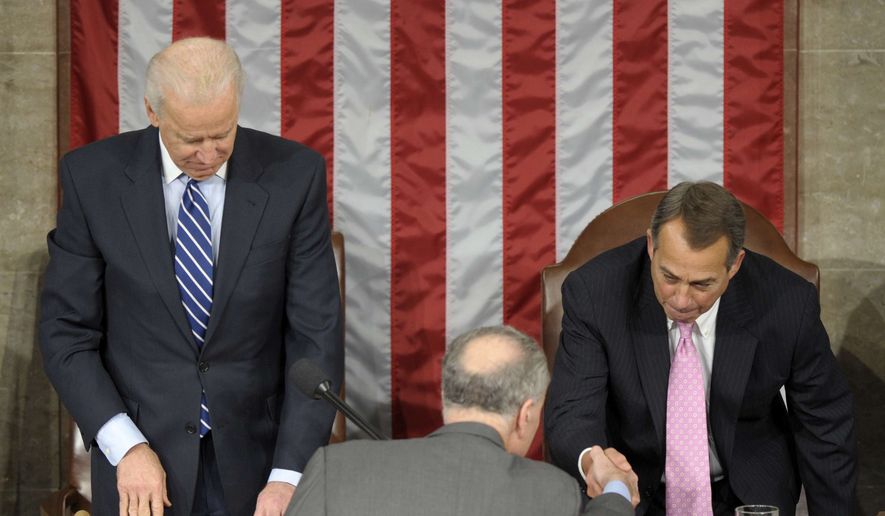Frustration is growing among a bipartisan group of senators who say President Biden is not taking seriously their push to rewrite a 135-year-old law that many believe inadvertently spurred the Jan. 6, 2021, riot at the U.S. Capitol.
The senators say the White House has been lukewarm to their entreaties to overhaul the Electoral Count Act of 1887, known as the ECA. According to these lawmakers, Mr. Biden and his lieutenants are ignoring the effort, opting instead to pine over partisan elections and voting bills that have no hope of becoming law.
“This should be a slam-dunk for the White House,” said one Republican lawmaker, who requested anonymity because of their role in the talks. “Yet, they’re not enthusiastic. I understand this isn’t on the scale of the Great Society, but it helps fortify the guardrails of democracy, and that’s significant enough in an era of wide polarization.”
The talks include Republican Sen. Susan M. Collins of Maine and Democratic Sens. Christopher A. Coons of Delaware, Joe Manchin III of West Virginia, Kyrsten Sinema of Arizona and Mark R. Warner of Virginia.
“It needs to be reformed,” said Sen. Jeanne Shaheen of New Hampshire, a Democrat involved in the negotiations. “I don’t think that addresses voting rights. I think we should get whatever done we can.”
For months, the senators have been discussing how to rewrite the ECA’s guidelines for counting and certifying Electoral College votes after a presidential election. Democrats and Republicans say the law has to be updated to remove ambiguity regarding the role of the vice president.
Under the law, the vice president presides over the Electoral College certification process. Exactly what that means was widely debated in the aftermath of the hotly contested 2020 election.
President Trump and his allies argued that the vice president could reject electors from states with “irregularities” about how the election was run.
Vice President Mike Pence and others took a different view. They said the ECA allowed the vice president only to preside over the count, not adjudicate its legitimacy. In making the argument, many noted that the ECA stipulates that only Electoral College tallies affirmed by governors can be accepted for certification.
“Under the Constitution, elections are largely determined at the state level, not by Congress — a principle I upheld on Jan. 6 without compromise,” Mr. Pence wrote in a recent op-ed in The Washington Post.
The ambiguity of the vice president’s role was one of the reasons a pro-Trump mob stormed the Capitol to try to stop the certification process.
Shouts of “hang Mike Pence” rang out from the mob. Protesters were dismayed that the vice president wasn’t exercising his power under ECA to change the outcome.
Democratic and Republican lawmakers say the law needs fixing to prevent such a situation from arising again.
A bipartisan group of at least 15 senators is holding talks on the issue. The group is looking at defining the role of the vice president and raising the threshold required to object to certifying a state’s electors.
Under existing law, only the objections of one member of the House and one member of the Senate are needed to force a vote on certifying the electors. Lawmakers want the threshold significantly raised.
“It has clearly become weaponized,” said Sen. Thom Tillis, a North Carolina Republican taking part in the talks. “We clearly have to make it clear that the vice president is in a ministerial position, and there should be a higher bar for lodging an objection.”
Republican leadership agrees with the assessment.
“I think it needs fixing, and I wish them well, and I’d be happy to take a look at whatever they come up with,” said Senate Minority Leader Mitch McConnell, Kentucky Republican. “I just encourage the discussion because I think it clearly is flawed. This is directly related to what happened on Jan. 6, and we ought to figure out a bipartisan way to fix this.”
Despite the bipartisan support, the White House has not thrown its weight behind the effort.
When bipartisan support for overhauling the ECA first emerged last year, Mr. Biden was almost entirely focused on securing his $1.75 trillion social welfare and climate bill. Once the big bill died because of Democratic disunity, the White House pivoted sharply to pushing an equally doomed effort to rewrite the nation’s voting laws, including an ill-fated attempt to blow up the filibuster to try to get it through the Senate.
With that entire endeavor also dead, lawmakers say, Mr. Biden should not waste further time before fully embracing a revamp of the Electoral Count Act.
Mr. Biden and his team are not sold.
White House press secretary Jen Psaki said changing the ECA is a positive step but pales in comparison with the more ambitious voting measures Mr. Biden wants.
“We’ve never said we were opposed to it,” said Ms. Psaki, adding that the ECA doesn’t achieve the massive overhaul of state election laws that the president prefers. “The Electoral Count Act doesn’t do that.”
• Haris Alic can be reached at halic@washingtontimes.com.




Please read our comment policy before commenting.